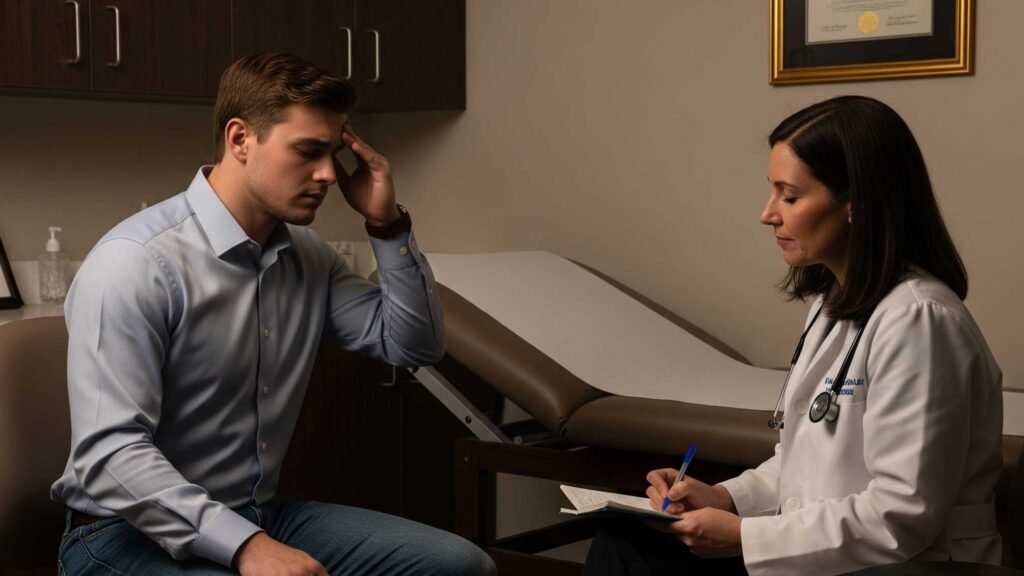Experiencing headaches after a car accident can be unsettling. You might wonder if you should be concerned or if it’s just a minor inconvenience. Headaches are common after vehicle collisions. However, their causes, severity, and recovery process vary significantly. Understanding why they happen and when to seek help can speed your recovery and prevent complications.
Post-accident headaches can range from mild tension-type pain to severe migraines. They might start right after the crash or develop days later. Some headaches fade quickly, while others persist and may signal underlying injuries. Knowing the difference between a normal headache and one needing medical attention is key to protecting your health.
This article explores the types of headaches that can occur after a crash. We’ll cover their causes, warning signs, and effective management strategies. Let’s dive into what causes these headaches, warning signs to watch for, and steps you can take to feel better.
Common Causes of Post-Traumatic Headaches

A post-traumatic headache develops after physical trauma, such as a car crash. These headaches often stem from injuries to the head, neck, or brain. Two common culprits are neck injuries and concussions. Both can trigger headaches that may signal deeper problems:
- Neck Injury (Whiplash). A sudden jolt in a car crash can strain or damage muscles, ligaments, or nerves in your neck. This trauma can cause pain that radiates to your head, leading to tension-type headaches. These often feel like a tight band around your head or aching at the base of your skull. Neck injuries may also cause stiffness. This makes it hard to move your head comfortably.
- Concussion. A concussion happens when your brain gets jostled inside your skull during impact. This can lead to headaches that feel throbbing or pounding. They’re sometimes accompanied by dizziness, nausea, or sensitivity to light and sound. Concussion-related headaches may not show up immediately. That’s why monitoring symptoms after an accident is so important.
Other factors like stress or dehydration can also contribute to headaches after a crash. However, neck injuries and concussions are the most common physical causes. Identifying the source of your headache can guide you toward the right treatment. It can also help prevent long-term issues.
When Headaches Signal Serious Problems
Not all headaches are harmless. Some can point to serious conditions that need immediate medical care. Knowing these warning signs can help you decide when to seek help. Here are red flags to watch for:
- Severe or worsening pain. If your headache gets worse over time or feels more intense than any you’ve had before, it could signal a problem like brain injury.
- Neurological symptoms. Confusion, memory loss, difficulty speaking, or trouble concentrating may suggest a concussion. They could also indicate something more serious, like brain bleeding.
- Vision changes. Blurred vision, double vision, or seeing flashes of light can all indicate problems with your brain or eyes after the accident.
- Nausea or vomiting. Persistent nausea or vomiting, especially with headaches, could point to a concussion or increased brain pressure.
- Weakness or numbness. If you feel weakness in your arms or legs or numbness anywhere in your body, get medical attention right away.
If you notice any of these symptoms, don’t wait to seek help. They could indicate serious complications like traumatic brain injury (TBI) or internal bleeding. These conditions require urgent medical attention. Even if your headache seems mild but lasts more than a few days, it’s worth getting evaluated. This can help rule out hidden injuries.
Managing Post-Accident Headaches
Managing headaches after a car accident involves combining home care with professional treatment. The approach depends on the severity. Here are practical ways to find relief:
- Rest and relaxation. Give your body time to heal by resting in a quiet, dark room. Stress and overstimulation can make headaches worse. Try to relax as much as possible.
- Stay hydrated and eat well. Drink plenty of water and eat balanced meals. Dehydration and low blood sugar can worsen headaches. This is especially true after the stress of an accident.
- Over-the-counter pain relief. Medications like ibuprofen or acetaminophen can help with mild headaches. Follow dosage instructions and avoid overuse. Overusing these medications can lead to rebound headaches.
- Cold or warm compresses. Apply a cold pack to your forehead or a warm compress to your neck. This can ease muscle tension and reduce pain.
- Gentle stretching. If your headache stems from a neck injury, light stretches may help loosen tight muscles. Make sure a doctor approves these stretches first.
For more severe or persistent headaches, medical treatments may be necessary. A doctor might recommend:
- Physical therapy. This addresses neck injuries and improves mobility, reducing headache frequency.
- Prescription medications. For migraines or severe pain, doctors may prescribe stronger medications to manage symptoms.
- Imaging tests. X-rays, CT scans, or MRIs can check for underlying issues like concussions or fractures.
Always consult a healthcare provider before starting any treatment. This is especially important if you suspect a concussion or neck injury. They can create a treatment plan tailored to your specific needs.
When to Seek Medical Attention
Knowing when to see a doctor is crucial for your recovery. Some headaches resolve on their own. However, certain situations require professional evaluation. Seek medical attention when:
- Your headache lasts more than a few days or keeps coming back
- You experience symptoms like dizziness, confusion, or vomiting
- Pain disrupts your ability to sleep, work, or perform daily activities
- You have a history of concussions or head injuries (this increases your risk of complications)
- You notice changes in vision, balance, or coordination
A doctor can determine whether your headache relates to a minor issue or something more serious. This includes conditions like concussions or neck injuries. They may order tests to check for brain or spinal damage. They can also recommend treatments to prevent long-term problems. Don’t ignore persistent or unusual symptoms. Early intervention can make a significant difference.
Preventing Chronic Headaches
Some people develop chronic headaches after a car crash. This means they occur frequently or last for months. Taking steps to prevent this can significantly improve your quality of life. Here are tips to reduce the risk of chronic headaches:
- Follow medical advice. Stick to your doctor’s recommendations. This includes rest, physical therapy, or medications. Completing treatment plans can prevent lingering problems.
- Manage stress. Accidents can be traumatic, and stress can trigger headaches. Try relaxation techniques like deep breathing, meditation, or yoga. These help keep your body calm.
- Maintain good posture. Poor posture can strain muscles and lead to headaches. This is especially true after a neck injury. Be mindful of how you sit, stand, and use devices.
- Stay active. Gentle exercise like walking or stretching can improve circulation and reduce tension. Avoid high-impact activities until a doctor clears you.
- Get enough sleep. Poor sleep can worsen headaches. Aim for 7-8 hours of quality sleep each night. Try to maintain a consistent sleep schedule.
- Limit screen time. Staring at phones or computers for long periods can strain your eyes and neck. This can trigger headaches. Take regular breaks and adjust screen brightness.
If headaches persist despite these efforts, consider working with a specialist. Chronic headaches may require ongoing medical care to manage effectively.
The Role of Neurologists in Treatment
For complex or persistent headaches, a neurologist can play a key role in your recovery. These specialists focus on the brain and nervous system. This makes them experts in diagnosing and treating post-traumatic headaches. Here’s how they can help:
- Accurate diagnosis. Neurologists can determine whether your headache is caused by a concussion, neck injury, or another condition. They may use advanced tests like MRIs or EEGs to assess brain activity.
- Personalized treatment plans. They can prescribe medications, recommend therapies, or suggest lifestyle changes. These are tailored to your specific condition.
- Monitor recovery. If you have a concussion, a neurologist can track your progress. They ensure your brain is healing properly.
- Prevent complications. They can identify early signs of serious issues like post-concussion syndrome. Then they take steps to address them.
Working with a neurologist is especially helpful if your headaches don’t improve with basic treatments. It’s also beneficial if you have symptoms like memory problems or dizziness. They can coordinate with other specialists, such as physical therapists, to create a comprehensive treatment plan.
Headaches after a car crash are common, but they shouldn’t be ignored. Whether caused by neck injuries, concussions, or stress, they can range from mild to severe. By recognizing warning signs and seeking timely medical attention, you can manage your symptoms effectively. Following preventive measures also helps reduce the risk of long-term complications.
If your headaches persist or worsen, a neurologist can provide expert care to guide your recovery. Stay proactive about your health. Don’t hesitate to contact a doctor if something feels wrong. Your well-being is worth the effort.
